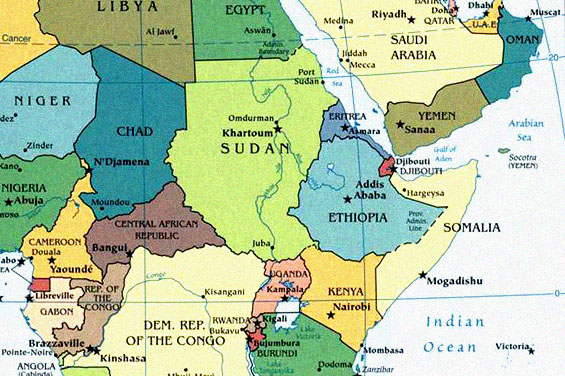
[HOME ] [ABOUT] [PHOTOS] [VIDEO] [BLOG] [HOUSTON] [TEXAS] [U.S. NEWS] [WORLD NEWS] [SPORTS] [POP CULTURE] [CONTACT]
Part II: Entebbe Agreement-Will Egypt Relinquish Nile River Dominace?

Nile River Basin Countries
by Joseph Earnest July 8, 2012
Newscast Media ENTEBBE, Uganda—Ethiopian Emperors have never been timid when they threatened to cut off the Nile if their demands were not met. Those on the other end of these threats did not for a moment doubt that the Ethiopian Emperors were able to turn off the taps of the Nile. In his well-written and interesting essay, Ibrahim continues to say that the hegemonic policy of Egypt had not changed by twentieth century.
A Swiss affiliate to King Khedive Ismail of Egypt, Werner Munzinger, had once remarked that; "Ethiopia . . . is a danger for Egypt. Egypt must either take over Ethiopia and Islamize it, or retain it in anarchy and misery." Egypt had attempted the first in 1832 and 1882 but failed. In today's world, an invasion is unlikely since the use of force in international relations is strongly condemned.
At different occasions Egyptian top officials affirmed their strong will to intervene with force to any disruption of the status quo. In 1979 Anwar Sadat, then President of Egypt, said immediately after signing the peace treaty with Israel that "the only matter that could take Egypt to war again is water." At another occasion he lashed out, "Any action that would endanger the water of the Blue Nile will be faced with a firm reaction on the part of Egypt, even if that action should lead to war." Boutros Boutros Gahali, when he was the Egyptian Foreign State Minister, confirmed the same conclusion when he said "the next war in our region will be over the water of the Nile, not politics." You may read or download the entire essay here. (pop-up)
According to Institute for Security Studies (ISS), the most controversial provision of the CFA is Article 14 (b) of the CFA, which reads: "not to significantly affect the water security of any other Nile Basin State’. Egypt and Sudan proposed that the article should be reworded as: "not to adversely affect the water security and 'current uses and rights' of any other Nile Basin States".
The problem the six states have with the phrase 'current uses and rights' once again stems from the fact that those rights were granted during the colonialism era, which is a bygone era.
Egypt's concern about the Nile being affected by the new agreement is addressed in Article III section 1. of the agreement that states: "The Nile River System and its waters shall be protected, used, conserved and developed in accordance with the following general principles: (1). Cooperation—The principle of cooperation between States of the Nile River Basin on the basis of sovereign equality, territorial integrity, mutual benefit and good faith in order to attain optimal utilization and adequate protection and conservation of the Nile River Basin and to promote joint efforts to achieve social and economic development..."
Ethiopia and other countries that are party to the agreement are developing projects pursuant to the same Article III section 6, that states:
Article III § 6—The right of Nile Basin States to use water within their territories: "The principle that each Nile Basin State has the right to use, within its territory, the waters of the Nile River System in a manner that is consistent with the other basic principles referred to herein."
During the colonial period, Britain effectively controlled the Nile through its military presence in Africa. However, Sudan and Egypt signed another agreement in 1959 giving Egypt the majority of the water flow, while ignoring all the other countries within the Nile Basin.
Article 19, Article 20, and Article 21 of the Entebbe Agreement override the colonial agreements allowing the once-ignored countries to exercise more control over the Nile.
Article 19 states: Legal Status—The Commission is established as an intergovernmental organization and shall enjoy international legal personality, with such legal capacity as may be necessary for the performance of its functions, in particular, the capacity to enter into agreements, to incur obligations, to receive donations, and to sue and be sued in its own name.
Article 20 section 2 states: The Conference shall establish its own rules and procedures.
Article 21 states: Functions—The Conference shall be the supreme policy-making organ of the Commission.
Egypt's Mohammed Morsy realizes a war against Ethiopia is a war against all other states within the Nile Basin. The most reasonable thing Morsy can do is attend the African Summit and resolve the Nile Basin conflict diplomatically.
The Nile is regarded as the longest river in the world stretching a distance of 4,130 miles, running through ten countries. The source of the Nile River is Lake Victoria, specifically in Jinja—Uganda, contrary to what fraudulent historians claim. Up North in Ethiopia, another section of the Nile called the Blue Nile originates from Lake Tana. The Nile gets its name from the Greek word "Nelios", meaning River Valley.
Click here to read or download the Entebbe Agreement (pop-up)
Related story:
Part I--The Nile River and The Entebbe Agreement >>
|
|
Join the Newscast Media social networks
for current events and multimedia content.
Copyright© Newscast Media. All Rights Reserved. Terms and Privacy Policy